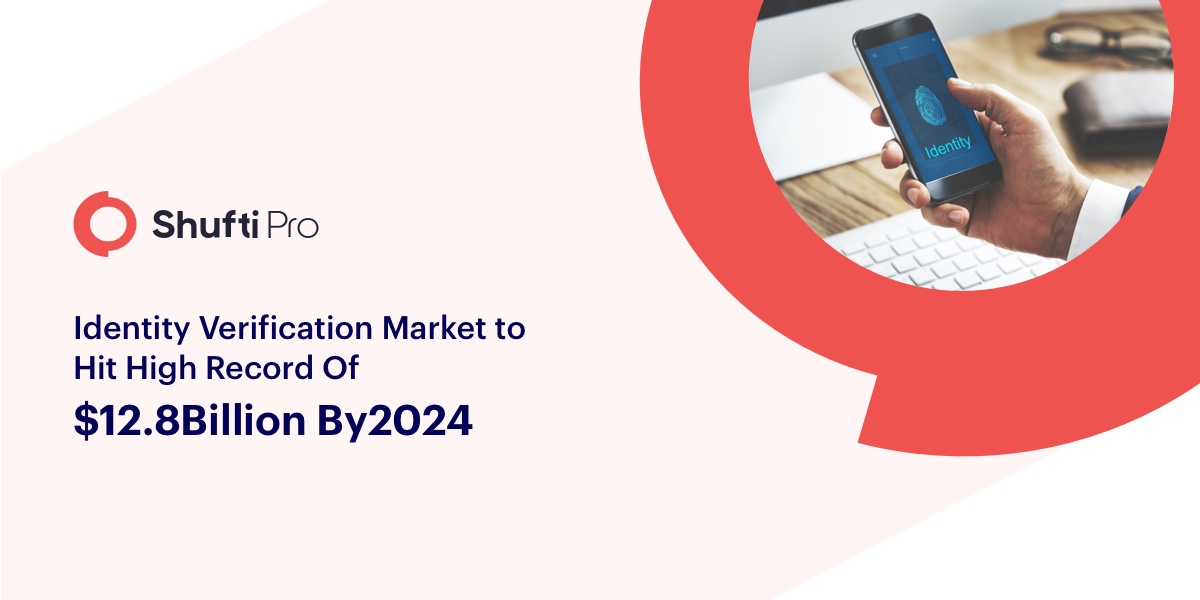Identity Verification Market ‘Hitting High Record’

The advent of technology has pushed businesses to digitize their operations for better customer experience. Moving into the fourth industrial revolution, the new chapter for human development has started incorporating advanced technologies. Merging the physical, digital and biological world is giving rise to novel business opportunities. It is an understood fact, opportunities and challenges always go side by side.
As we move into the digital world, security and privacy concerns are on the rise and expected to grow more in the upcoming years. The organizations that will embrace the technological evolutions for customer security and meeting regulatory compliances are the ones that going to thrive fourth industrial revolution. It leads businesses to adopt effective, fast and convenient identity verification solutions.
Identity Verification – Going Through The Roof
The organizations are leveraging AI technology to combat rising digital fraud and improve customer experience. The businesses are reaching out for third-party security and verification solutions; ultimately setting higher demands for the industry. As per the market research report, the Identity verification market is expected to grow $12.8 billion by 2024 at the Compound Annual Growth Rate (CAGR) of 16.0% during the forecast period.
The upcoming industrial revolution is going to be customer-centric and it is believed that customer experience is going to shape the future of organizations. Moving into the digital sphere has created understanding among the business about the need for secure digital identities. At the same time, convenience and simplicity are equally important in driving customer experience. The combination of both of these requirements forms a concept of secure growth that is important for the success of any business or organization. Online Identity verification is the best way to achieve both at a time — security and optimized processes.
Identity Proofing and Customer Experience
Satisfied customers are true assets for the business. Esteban Kolsky claims, 13% of the unhappy customers tend to tell 15 or more people about their bad experience contrary to 72% of happy customers sharing positive reviews to at least 6 people about the business. Securing customer identities and information is a positive step towards retaining the customers. Verifying the customers doesn’t only secure the business from fraudsters and risky individuals but also provide fruitful customer experience.
Not to forget that verifying and authenticating identity is a necessary step in know your customer (KYC) process. With the businesses moving towards digitization, manual KYC is no longer effective since it is quite a time-taking process and requires more resources. The customers don’t tend to wait, and eventually move to another organization. Also, the physical distance between customers and has drastically reduced and will continue to reduce in the future as well. It means that customers no longer need to visit the organization manually to carry their activities, for example, opening accounts, transferring payments, etc. This is the reason the businesses are going to need AI-based verification solutions that can onboard secure clientele in real-time and reduce customer drop-off rates.
The rise of Synthetic Identities and Document Verification:
With the fake identities being recognized by the organizations, the criminals have shifted their focus on the creation of synthetic identities. Synthetic identities due to its hybrid nature (a combination of real information with fake ones) raise a major concern for organizations. They need to find ways to hinder such identities and establish trust with the real customers that they have no previous relationship with.
The combination of accurate facial recognition, document verification and other variety of verifiable identity sources – powered by artificial intelligence and machine learning – aim to support digital onboarding and meet know your customer (KYC), Anti-Money Laundering (AML) and Customer Due Diligence (CDD) regulations. Recently, according to research from Google intelligence the digital identity and document verification services will be a $15 billion industry by 2024, growing at 20% percent from 2019.
The pressure of Global Regulatory Agencies:
Online identity and document checks cover three basic questions to organize the whole onboarding process in a unified workflow:
- Is the person is real? With remote presence.
- It the document original with no tampered information?
- It the person is safe to do business with? Having no criminal history and doesn’t fall under any sanction list.
These questions are essential to meet global compliance. Organizations have a clear idea that violating regulations won’t only make them liable to hefty fines, but it also has a great impact on reputation in the market. The data report published by Fenergo, detailing global fines activity of regional and in-country regulators from 2008 to 2018 states the monstrous fine has been imposed on the organizations. The reason was non-compliance with AML, KYC and sanction regulations in the past decade.
Taking into account such trends of organizations, AI-powered identity verification services seem to be the perfect solution. Some businesses have already adopted these variations and other will be following them soon.
Read More: Warning: You’re Losing Money by not Using Biometric Identification











